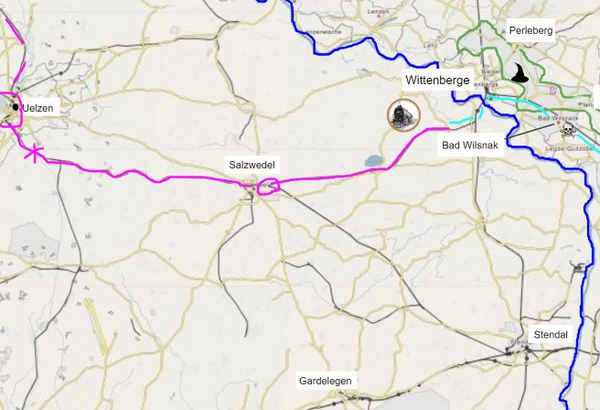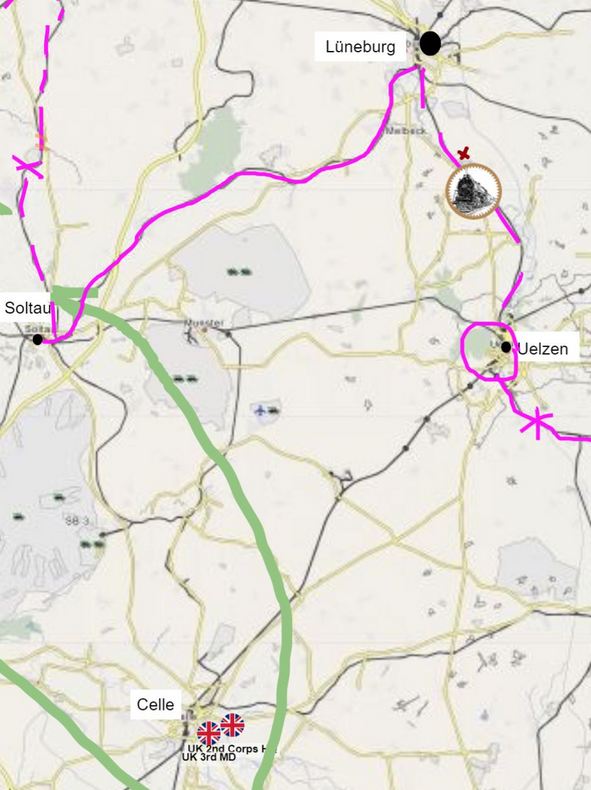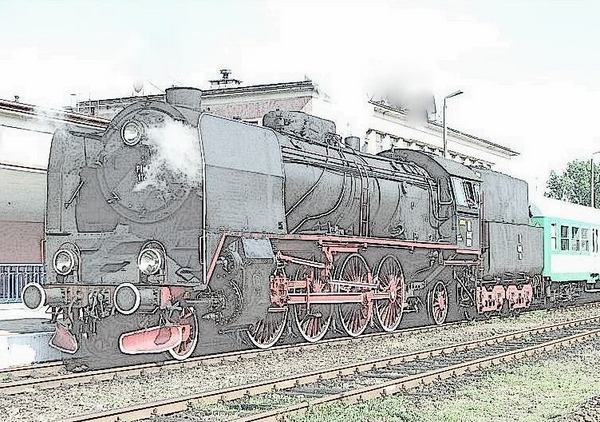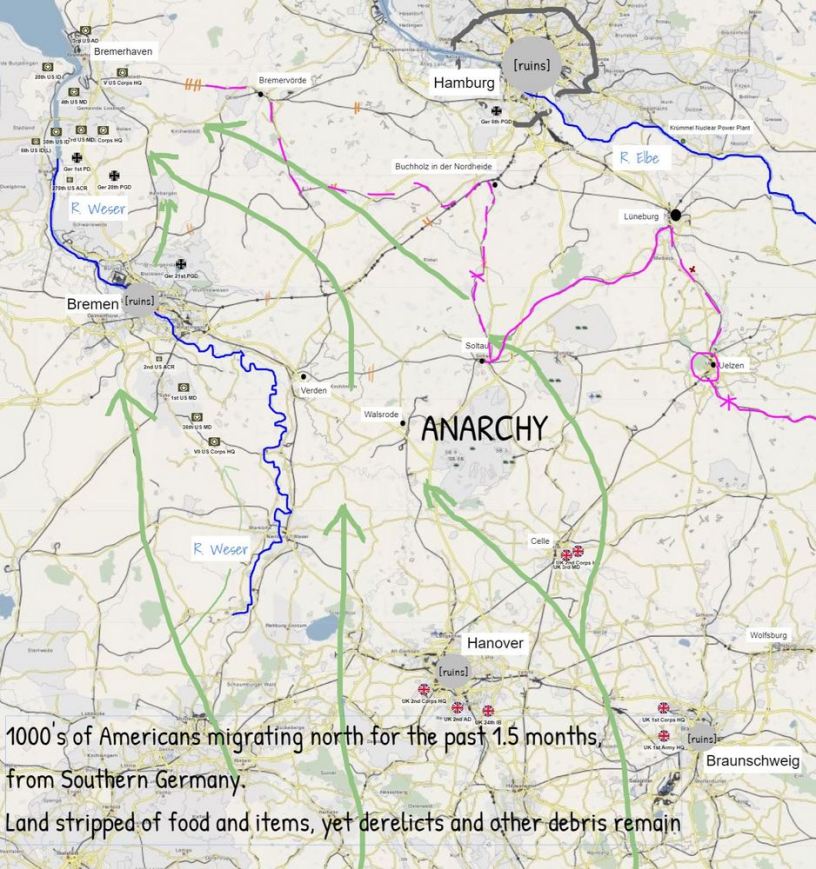11 November 2000 1200H. Across the Elbe. West of Wittenberge, Germany.
Four days until the fleet departed Bremerhaven, with or without them.
Other than the strange witch incident, traveling the state of Brandenburg had been a respite for his full crew, as it was mostly quiet forest, sparsely populated even before the war.
He’d learned that large cities often meant large military units in cantonments, so Maks intended to keep the train to the open countryside as much as possible.
Lower Saxony, Maks was learning to his dismay, was in rough shape.
Thousands of Americans, stationed mostly in Southern Germany, had been travelling north during October and part of November. Mostly on foot, in small groups, this migration covered a wide swath of Germany.
“Large numbers of Americans are rushing towards Bremerhaven. For most, large scale unit integrity has vanished, and most of the divisions, regiments and brigades are now nothing more than small groups of soldiers moving [north].”
– Going Home, page 6
I go into much greater detail in part 3 my analysis of Going Home:
Going Home – The Military Units, Part 3: Approaching Bremerhaven
This large movement of American troops had been incredibly disruptive to an already fragile post-war Germany. The land was stripped of any remaining food. Where the locals had carefully hoarded stores of food for winter, Americans bought or stole as they passed through. For a month and a half, this tragic story repeated over and over.
After the human wave passed, roving bands of highwaymen and bandits were inevitably drawn to the chaos and vulnerability in Lower Saxony.
I got to use a new territory type: Anarchy.
“Anarchy: Most settlements in the territory have already been looted and ruined. Very few people are left outside of the larger fortified towns, and no form of organized rule exists in the countryside. Marauder gangs and individual families are the most common social units. Trade does not exist within the territory, and travel is very hazardous.”
– Twilight 2000, v2.2 rules, page 157
In actuality, this desolation worked to Maks’ advantage. There was little that could pose a threat to his train of 300 Americans, except another large unit or a hostile town. That, and the poor condition of tracks in the area.
Trains hadn’t been running for years, and tracks were both neglected and looted for rails and ties near towns. This lack of rail activity – here and elsewhere – also meant no marauder band was going to set a fruitless ambush along an abandoned rail line.
From the time when the party was back in Poland, Maks was always very thorough in trading information with everybody, be they strongmen or local civilians. Now heading for Bremerhaven, knowing they’d not be allowed to bring much on the ship, Maks could afford to be generous, also trading supplies for information.
11 November 2000
The trip got off to a poor start. The first town, Salzwedel, was not keen on allowing Maks’ train through town. That, and much of the track had been pulled in town. Maks, by now a half-expert in railroad track repair, estimated the fix would be a 12-hour job, including cannibalizing rails and ties from unneeded spurs nearby.

Through a combination of cajoling and Persuading, Maks got the town fathers to relent, and permit Maks’ crew to repair the line and continue through.
His men worked through the night.
12 November 2000
They passed through Salzwedel in the dark hours of morning. Maks had the train parked along a quiet section of track before Uelzen at 0400H. There, his exhausted men got a brief rest. Maks set the usual perimeter defenses, but there was no encounter.

At 0800H, his scouts approached Uelzen, which was standoffish in negotiations.
I rolled “Neutral” on the Settlement Attitude table (page 167 of the rules). I then rolled “Food Shortage” on the Settlement Crisis table (page 168).
Maks had no extra food to trade, but he offered the next best thing, weapons. The leaders of Uelzen let the train pass, and Maks was two M-16s and a case of ammo lighter.
They also traded info, and it was here that Maks learned about the desolate region ahead of them. Americans had been passing through by the thousands. The Brits, however, were staying put, seemingly intent on salvaging Germany’s industrial heartland for their own benefit.
At 1000H, following a tip that Lüneburg to the north was open for trade, Maks sent the train in that direction.
A Peculiar Find
Along the way, his scouts reported trash and debris littering a field adjacent to the tracks. It was fresh, and hadn’t been picked-over by human scavengers. It turned out to be the contents of two aircraft cargo containers had been dumped, likely from that An-12 transport plane that flew by them north of Berlin.
The lightweight containers had disintegrated on impact, their contents spewed in a blast pattern. Most was junk now, but enough pieces survived to hint as to their purpose: Schematics, tool dies, and high-tech manufacturing assemblies of unclear origin. Maks had his men load anything promising onto the train, including notebooks and papers. Most were written in Russian, but there were a couple of journals written in a flowing, Arabic-like script.
 I wanted to randomly determine a couple of surviving artifacts. Broken Earth is a post-apocalyptic RPG available from DriveThruRPG. Aside from being an intriguing RPG in its own right, it’s got a great post-apoc loot table using a deck of cards. Using that, and some creative interpretation, I determined the following salvage was recovered:
I wanted to randomly determine a couple of surviving artifacts. Broken Earth is a post-apocalyptic RPG available from DriveThruRPG. Aside from being an intriguing RPG in its own right, it’s got a great post-apoc loot table using a deck of cards. Using that, and some creative interpretation, I determined the following salvage was recovered:
- 3 cases of freeze-dried coffee
- Map of the region around Minsk, with some hand-written notations in Russian
- Ranged IR thermometer
- A LED flashlight, astonishingly bright. Neither Maks or any of his Americans had seen anything like it. It had no company or manufacturing markings
Maks knew some Russian, and thumbed through the papers. It was all highly technical and incomprehensible to him. The documents would wait for more thorough analysis later.
Lüneburg
The intel was incorrect, or out of date anyway. Lüneburg was closed due to epidemic.
The track looked in good shape, and Maks briefly considered bulling his way through. But there was a detachment of German troops of the 6th Panzergrenadier Division out of Hamburg. It was easier for Maks to adjust his route, and chug southwest to Soltau.

At 1500H the train arrived at Soltau. The townsfolk were “Frightened”, taking pot shots at the scout vehicles that attempted contact. Maks instead opted to take a line that turned north before town and bypass that headache. They bivouacked well north of Soltau for the night.
Encounter = None. I kept rolling high on the encounter chart thus far.
13 November 2000
At 0700H the train arrived at Buchholz in der Nordheide.

I rolled “Neutral” and “Engineer Needed” result (just as in Salzwedel), which I interpreted (again) as a lot of the track through town had been torn up for building materials and defensive works.
They too had a detachment from the 6th PGD, who accompanied the town fathers to the parley. Maks was persuasive, assisted by generous gifts (M-79 GL, 13 HE rounds, case of frag grenades, and a case of 7.62mm NATO). The lieutenant wanted the train held until he could confer with his higher-ups in Hamburg, but was overruled by the mayor and militia commander.
The tracks would have taken 9 hours to repair, but they got it done in 7 with the help of the townspeople. He was also warned about track damage along a couple of his prospective routes.
At 1400H Maks’ train pulled out of Buchholz in der Nordheide, making for Bremervörde. They spent 1600H to 2300H repairing track damage they hadn’t been warned about.
I rolled for encounter again while the train was parked. Finally! “Group”. I rolled on the Group table. sigh! … “Refugees”. Dice said 20 of them.
Twenty refugees showed up at the work site, begging for food. They were desperate, and on their way to Bremerhaven. If the Americans could feed tens of thousands of their troops gathered in that small city, surely they could spare some food for civilians they hoped.
Maks was feeling magnanimous. He fed them, and allowed them to hitch a ride on his rear flat car. The repair finished late, and Maks decided to camp there for the night.
Rolling for encounters overnight came up None.
I use the “River” column as the best analogue for a train (which includes “Hazard” as a result; this I interpret as track damage). Ironically, Anarchy on the table adds +1 to the d6 roll, meaning – I belatedly realized – the only possible encounter results are Item, Hazard, Hazard, None, None, None. (My previous result of “Group” was a mistake on my part, but I went with it.)
I’d been hoping to roll up one last fight organically, but hadn’t really looked over the table columns beforehand.
14 November 2000 0600H
“This is it men!”
Maks assembled his 300 soldiers, and gave them a rousing speech. They had one day left. No screw-ups. They could – and would! – make it.
At 0800H, their scout vehicles reached Bremervörde, which was – amazingly – Friendly. They passed through town without incident.
The good luck came to a sudden end. Just west of Bremervörde, Maks’ heart sank as he saw the worst track outage yet. For more than a kilometer, the rail bed had collapsed into the surrounding marsh, probably the result of flooding in the past few years. It would take 18 hours to rebuild, or more. Too much time.

The choice was clear. They were only 20km from Bremerhaven, which they could cover on foot in 4 hours. Maks ordered the train abandoned, and prioritized what gear would be brought along.
It was a sad end for the Korzub, which had faithfully carried them across the better part of Northern Europe.

Bremerhaven
At 1300H, they arrived in the outskirts of Bremerhaven, and halted for the American sentries guarding the perimeter.
They made it, with 23 hours to spare.



Really glad they made it, I loved following along that section of the campIgn.
Cheers,
Pete.
LikeLiked by 2 people
Well, Some Lucky German is going to find themselves the owners of a fully functional steam train…
LikeLiked by 2 people
Good catch! But my brother was on that…
Maks had the engineers do the train equivalent of “removing the distributor cap” Maks already has plans to tell command in Bremerhaven I reckon. Remember he has the steam locomotive engineers with him, Straczynski and Martens. Without them, the steam train is just a big hulk.
LikeLiked by 1 person
Europe has long had trains as a major part of moving people and machinery and food and you name it.
I would expect that if the US soldiers showed up with some train experience, that it would be reasonable to think civilian train folk and German military have a better chance of having the train experience that the party had! It hasn’t been that far from the rails were really used (before the war) and so there would be a lot of train folks still – Germany would have snatched up many of these when the war got serious.
I think there’s every chance to imagine that German government or civilians could go get the train (and fix it) just like Maks and his team did.
LikeLiked by 1 person